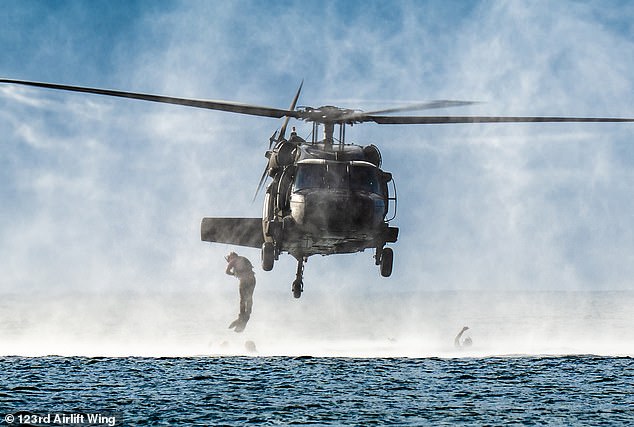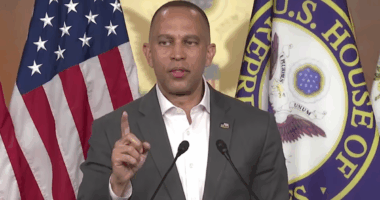A former top US national security official has called for a wider military campaign against Venezuela, warning that years of failed diplomacy and sanctions have left force as one of the few tools remaining to confront Nicolás Maduro’s dictatorship.
Speaking exclusively to the Daily Mail, Craig Deare — a veteran Army intelligence officer, former White House aide, and national security scholar — said the time had come for Washington to get serious about the threat emanating from Caracas.
‘Venezuela is no longer a legitimate sovereign government — it’s a criminal-terrorist entity run by President Nicolás Maduro and his crew,’ Deare said.
‘If Washington threatens force, it has to be willing to use it. Otherwise, it looks weak and emboldens adversaries.’
Deare proposes everything from intelligence, surveillance, and reconnaissance missions to cyber operations, special forces activities, and precision airstrikes using guided munitions against key military or leadership targets.
Meanwhile, US warships would blockade to disrupt Venezuela’s oil shipments, perhaps even boarding and seizing tankers that finance Caracas, as airstrikes destroy the regime’s arsenal of Russian-supplied weapons systems.
His comments come as President Donald Trump’s decision on Monday to halt diplomatic efforts with Venezuela, paving the way for a military escalation against drug traffickers or Maduro’s government.
Trump on Sunday said that the US Navy had sunk another suspected drug-smuggling boat on Saturday night — the fourth such attack in recent weeks — killing four people.

Soldiers jump from a helicopter during a practice operation in the US Virgin Islands as tensions rise between the US and Venezuela

US President Donald Trump said US military strikes on Venezuelan drug boats will soon move onland
‘In recent weeks, the Navy has supported our mission to blow the cartel terrorists the hell out of the water,’ Trump said during a speech at Naval Station Norfolk, beside the aircraft carrier USS Harry S. Truman.
‘We did another one last night. Now we just can’t find any. They’re not coming in by sea anymore, so now we’ll have to start looking about the land.’
Defense Secretary Pete Hegseth confirmed the operation, telling Fox News he had ‘every authorization needed’ for the Caribbean strikes, which the White House says aim to sever drug pipelines feeding America’s deadly fentanyl and cocaine crisis.

Craig Deare wants to topple the ‘criminal-terrorist entity run by Maduro’
US Secretary of State Marco Rubio has long pushed for tougher action against the regime of Maduro, whom he brands an ‘illegitimate leader’ and an ‘imminent threat’ to US national security.
But critics, including congressional Democrats and legal experts, are demanding answers about the legality of attacking vessels in international waters and killing suspected traffickers without trial or capture.
Deare, who spent two decades in the US Army and later advised on Western Hemisphere affairs at the National Defense University, said the Trump administration’s growing confrontation with Venezuela was both overdue and fraught with danger.
He sees the tropical country’s collapse — marked by runaway inflation, food shortages, and the exodus of more than seven million refugees — as a festering threat that extends well beyond its borders.
Still, he cautioned that Venezuela ‘isn’t Panama — it’s much larger and more complex. No one’s talking about a full-scale invasion.’
Instead, he outlined a menu of military options short of war: ‘The toolkit ranges from cyber operations, intelligence, and special forces to precision strikes and naval blockades. The goal is pressure, not occupation.’
That pressure, he added, should be directed squarely at Maduro’s inner circle, not the general population.
‘The idea would be to go after regime elites and their assets, not ordinary soldiers or infrastructure,’ he said.
The former national security chief acknowledged that a more aggressive posture carries serious risks — including worsening Venezuela’s humanitarian crisis, destabilizing neighboring Colombia and Brazil, and sparking political blowback in Washington.

Deare calls for precision airstrikes using guided munitions against key military or leadership targets in Venezuela

Venezuela’s President Nicolas Maduro on Sunday posted a defiant message on Telegram condemning American ‘aggression’

Minister of Defense Vladimir Padrino Lopez (center right) supervised a training session on military leadership and defense on October 4 in Caracas, Venezuela

The US military is practicing operations in the Caribbean amid rising tensions with Venezuela
‘Yes, there are risks,’ he said. ‘But look around — Venezuela is already hollowed out. Inaction is the greater danger.’
Deare said Maduro’s government, long propped up by Cuban intelligence operatives and Russian military advisers, has effectively turned Venezuela into a hub for organized crime and terrorism — citing the US designation of the Cartel de los Soles as a Foreign Terrorist Organization.
He argued that the US must now confront the regime as a narco-terrorist enterprise, not a traditional state.
Maduro responded to the latest US strike on Sunday, posting a defiant message on Telegram condemning American ‘aggression.’
‘Our people have never and will never be afraid to defend their right to live and be free,’ he said.
‘We will be ready to face any scenario.’
Venezuela’s Foreign Minister Yván Gil said Russia’s Sergei Lavrov called over the weekend to express ‘full solidarity’ with Caracas, while Maduro reportedly sent a letter to Pope Leo XIV seeking help to ‘consolidate peace’.
But in Washington, officials say they are unmoved. Trump’s team views the Caribbean drug war as part of a broader campaign to restore US dominance in the hemisphere — and to send an unmistakable signal to authoritarian rivals.
Deare stressed that military action, if taken, must fit within a coherent strategy that includes diplomacy, economic measures, and long-term stabilization plans.
‘Military action has to be part of a broader strategy — diplomacy, economic tools, and post-conflict planning,’ he said. ‘You can’t just drop bombs and walk away.’
He said the best outcome would be a negotiated exit for Maduro and his lieutenants, allowing opposition forces to take control without mass bloodshed.
But, he added, ‘that won’t happen without serious pressure.’
In Deare’s view, credible US force is not just about Venezuela — it’s about reasserting American resolve after years of perceived drift.

Armed civilians participate in a military deployment in support of Venezuela’s presidentin Caracas in September

US Marines V-22 Osprey fly near Ceiba, Puerto Rico, amid strikes on alleged narco-terrorists in Venezuela
‘Showing resolve in Venezuela would restore stability in the region and send a clear signal to China, Russia, and Iran that the US is serious again about its own hemisphere,’ he said.
With the US Navy now patrolling the Caribbean in its largest deployment in decades, fears are mounting that a limited campaign against smugglers could spiral into something much bigger.
The Pentagon insists that the operations are narrowly targeted at traffickers, but the choice of Venezuelan waters and Trump’s fiery rhetoric have raised speculation about a proxy showdown between Washington and Caracas — and, by extension, Moscow.
Christopher Sabatini, a senior research fellow at Chatham House and lecturer at the London School of Economics, has called Trump’s policy on Venezuela a ‘revenge fantasy’ following week progress in his first term.
Top administration officials have ‘completely exaggerated’ the threat posed by Venezuelan drug trafficking to justify its military actions, Sabatini says, and are pushing for ‘regime change, and they want it as cheaply as possible’
Sabatini called the escalation a ‘significant and risky allocation of US assets that are badly needed elsewhere.’
For Deare, that danger is part of the point. ‘You don’t get change in Venezuela by hoping,’ said the author of a book on US-Mexico military ties. ‘You get it by showing power and meaning it.’









